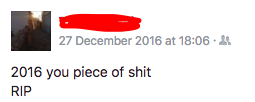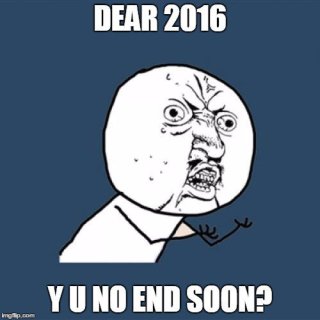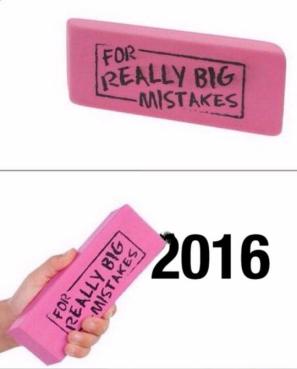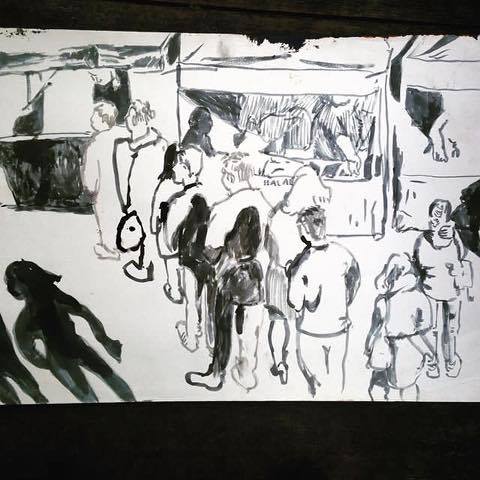
Over the course of the year, increasing outbursts filled with a ‘fuck you, 2016’ essence spilled into my social media feeds. So much so, that by the time the year came to a close, the last 365 days had seemingly been summarised in one bestial, villainous enemy: 2016.
These attacks on the past year seem to lament a wide variety of events and catastrophes all under one banner, from the deaths of various celebrated artists and celebrities, to Brexit and the election of Donald Trump.
I want to explore the meaning and consequences of this embodiment of a time period -born on the 1st January, and dead on the 31st December. Does sensationalising 2016 as the worst year ever, as a threatening enemy of humankind, directly limit the ways in which people confront political upheaval, humanitarian crises, death and climate change?

Firstly, the assertion of the past year as some sort of Grim Reaper, killing off acclaimed personalities including David Bowie, Leonard Cohen, Prince, and Alan Rickman, one by one, is unnecessary sensationalism. Tragically, people die. They also died in 2015, and they will continue to die in 2017. Perhaps this sems heartless, but the overt public mourning for these heroes compared to the ongoing conflicts and refugee crisis in other parts of the world appears insensitive. Undoubtedly, other events in 2016 have indeed suggested we are at a unique turning point; that the damage done to international security as a result of the global political earthquake could be irreparable. Nationalist and populist forces were at work in the support and succession of Trump and Brexit’s campaigns, ran primarily on anti-globalisation and anti-immigration sentiments, the 58% spike in hate crimes that followed the UK’s decision to leave the EU, several police shootings, escalation in Syrian conflict as a result of Russian intervention – and the subsequent restoration of Russia as a key influential global player, as well as record hot temperatures (and a climate change denier as the US President)… 2016 really does seem awful, doesn’t it?

However, isolating these events to one year is unproductive. The outcome of these prominent 2016 elections was enabled by years of growing anti-establishment sentiment and hostility in response to patterns of immigration and its press coverage. The Syrian war dates back 5 years, and the situation in the Middle East in general much longer. The situations and conflicts that people are fleeing, as well as the unwillingness to receive them through fear of and animosity towards ‘the Other,’ long predate 2016. In 2015, Tim Ash described an atmosphere that is strong prevailing, claiming that the walls are going back up: it is 1989 in reverse. Indeed, the Global Peace Index has published data that shows the world has been getting less peaceful over the last decade. Causes and consequences of occurrences in the last year spill on to each side. A yearly narrative that associates these circumstances as events trapped within the confines of 2016 is suggestive of the menial ‘new year, new me’ discourse, commonly thrown around regarding the transition from one year to another: a chance to wipe the slate clean and start afresh. History and society is not the same, and it is dangerous to neglect the patterns that bought us to our current global situation, and consider the future.

Merging all the negative developments of the last year under one solitary umbrella of ‘fuck 2016’ appears to have the effect of ascribing responsibility to an anonymous, ubiquitous villain. This seems to redirect any sort of accountability – or has the effect of in fact not placing it anywhere at all. Instead, historical, political and social change becomes something that is done to people, something that happens. By utilising a narrative that depicts 2016 as ‘a year that changed the world,’ where do we find the active individuals and processes that drive these changes along. Instead, we are offered an apocalyptic scenario with no understanding of how or why it came about, or who has the capability to change it – and certainly no confidence that we have the power to act as historical agents as well.


Featured image painted by Lily Jenkins
